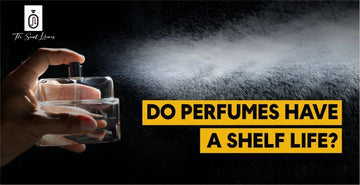Yes, perfumes do expire, typically lasting between 3 to 5 years, depending on their composition and storage conditions.
Perfumes, much like fine wines, are often considered timeless. But do they really hold their allure forever? This question is not only intriguing to fragrance aficionados but also vital for anyone who cherishes their perfume collection.
Through this post, we'll explore the world of perfumes to uncover the truth about their shelf life. Have a look!
How Long Does Perfume Last?
Perfume does have a shelf life, but how long it lasts depends on a few things, like its ingredients and when you first open it. Most perfume makers suggest you consider replacing your bottle anywhere from one to three years after you open it. However, unlike food, perfume doesn't go "bad" in the traditional sense, so it's often okay to use it for four or even five years.
In our experience, perfumes don't necessarily lose their strength, but they can change in scent. They might become slightly off like they've gone sour, sometimes even acidic or metallic, or with a hint of plastic in the smell. This happens because too much oxygen gets into the perfume bottle and can mess with the fragrance molecules, which affects the overall scent.
Some perfumes are more likely to do this than others, so some last longer. Experts say perfumes with solid base notes have the longest shelf life. You can think of these perfumes like fine wines—they get better as they age. Perfumes with base notes like white patchouli and amber scents, often found in oriental scents, are good examples.
On the other hand, perfumes with lighter base notes last less time. How long your perfume lasts also depends on how you store it. If you keep your fragrances correctly, they'll stay good much longer than if you don't.
If your perfume expires, it could give off an unpleasant smell, cause skin irritations, or, in really extreme cases, even trigger an allergic reaction. If your perfume is a couple of years old, giving it a sniff test before putting it on is a good idea.
How Do You Know When Perfume Has Expired?

You can figure out if your perfume is past its peak by giving it a little sniff, a glance, and a quick look for any expiration dates that might be hiding.
Some people think as long as your perfume still smells fantastic, it's good to go – even if it has a slightly different scent. But others aren't so sure about detecting perfume's expiration date.
We have some ways to help you check if your perfume is expired:
1. Test the Fragrance Smells
By sniffing it, you can easily check if your perfume isn't at its best anymore! Perfumes can change with time, especially if they contain fragrance oils that can go bad. But scents without those oils tend to last longer.
So, if your beloved fragrance starts smelling like vinegar or doesn't quite match the original scent anymore, it's a sign that it might have expired. Trust your nose – it'll tell you if your perfume has seen better days!
2. Does Your Perfume Have the Same Color?
Here's a neat trick to check if your perfume is still good: just look at its color! If your perfume has turned darker than when you first got it, that might be a sign it's gone bad. So, if it started as a clear or goldish liquid and now looks more cloudy or amber, it could have expired.
Over time, perfumes with lots of alcohol can lose some of their scent as it evaporates. If you notice less liquid in the bottle than before, your perfume might have expired.
3. Check the Expiration Date on the Fragrance Packaging
There are clues on the packaging to help you determine whether the perfume has expired. You'll usually find an expiration date in the form of a batch code or a PAO (Period After Opening) number. These numbers are like secret codes telling you when your perfume might lose its magic. Look for them at the bottom of the perfume bottle or in the box.
There might be other numbers, like a catalog or barcode, but be clear. Knowing which one is the 'expiry' number is the key to knowing if your perfume is still good to use. So, keep an eye out for those important digits!
Can You Extend The Shelf Life Of Perfume?

To make your perfume last longer, you must store it correctly. Storing your fragrance properly means protecting it from extreme temperature changes. Although keeping your perfume in the bathroom seems convenient, the constant shifts from hot to cold can make it go bad faster.
Humidity is another culprit that can mess with the chemicals in your perfume. So, if you love your summer perfumes, storing them in a cool, dry place is wise. Also, avoid leaving your perfume in direct sunlight, as the heat can break down its chemical structure and weaken its scent. Keeping your perfume in the fridge can help maintain its freshness. But remember, when you remove it, the sudden temperature change can harm it just as much.
Look for a cold, dry, and dark place, such as a closet or drawer in the bedroom, for a long-lasting smell. It is advisable to keep your perfume in its original container to avoid air exposure, which might upset its chemical balance and hasten the alcohol's evaporation. Your favorite smells will linger much longer with this method.
What Do You Do When Your Perfume Or Fragrance Expires?
Wondering what to do with that old, expired fragrance, you've got lying around? Well, here's a simple and eco-friendly way to bid it farewell.
- First, take the fragrance bottle and empty its contents into your sink.
- Then, thoroughly rinse the drain with hot water and soap to remove leftover oils. The soap contains special agents called surfactants that make it easier for the fragrance to flow through your septic system without causing any trouble.
- Now, when it comes to the bottle itself, most fragrances are packaged in glass bottles, which is great for recycling. However, there's a little catch – you'll need to disassemble. Get rid of the plastic parts, like the cap, nozzle, and that tricky plastic straw. Once done, you can toss the glass part into your recycling bin without worry.
- Don't just stop at recycling. You can also get creative and repurpose those fragrance bottles. They make awesome vases, fancy candle holders, or even stylish containers for your makeup brushes.
Is Using an Expired Perfume Safe?

It can differ sometimes from perfume to perfume in terms of how it affects your skin and clothing. Some perfumes contain chemicals that might hurt your skin and leave stains on your clothing, especially in areas where they have never been before.
Always start with a patch test. Find a small spot, like the inside of your wrist, and apply a tiny bit of the perfume there. Wait for a whole day, 24 hours to be exact. If your skin doesn't react and you're feeling good, then you can cautiously use the perfume on your skin.
But what if you still need to decide about putting it directly on your skin? You can still enjoy the scent by spritzing it on your clothes. A scarf or a handkerchief tucked inside your clothing, like a skirt or trousers, can be a cool way to wear your favorite perfume without worrying about skin reactions or stains. So go ahead, smell great, and feel great!
FAQs
Does Perfume Expire If Unopened?
A brand-new perfume bottle stays fresh and lovely for about a year and a half. However, if you have a perfume with a light and refreshing scent, like citrus, green notes, or delicate flowers, it might start losing its charm a bit earlier.
How Long Do Unopened Perfumes Last?
Unopened perfume bottles can last long if stored in a dry, dark, and cold place. The precise length of time can vary based on the type of scent and how carefully it is stored, from a few years to even a few decades.
Conclusion
Certainly, in simple terms, yes, perfumes do expire. They don't last forever. Typically, you can expect them to remain good for about 3 to 5 years. However, this can vary depending on how you store them and their quality.
To make your perfumes last longer, store them in a cool, dark place, keep the bottles sealed tightly, and avoid exposing them to light, heat, or air. Taking good care of your fragrances can help you enjoy their lovely scents for a longer time.
Also Read:



